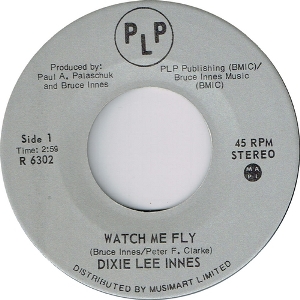| |
Dixie Lee Innes

Watch Me Fly / Just a Little Love - 7"
PLP - 1977
Michael Panontin
|
Most people around the world will remember the Original Caste as the one-hit wonders behind the topical sing-songy hit 'One Tin Soldier', a top-ten single up here in Canada in 1969 and an even bigger success in Japan. But for the group's cherubic singer, Dixie Lee Innes, it was just a moment in a musical career that stretched back to her pre-teens.
"I started when I was about eleven, and I joined a rock and roll band," a soft-spoken Innes told Edmonton's CFRN back in 1974. "My sister had a bunch of friends in school that had a band, and I just started singing a whole bunch of Brenda Lee songs with them."
Innes first performed live at age fifteen, and by 1963, while still a 17-year-old high school student, she scored a local hit (as Dixie Lee Stone) on Mel Shaw's short-lived Sotan label, with the Calgary Herald writing that she held "second place on three city hit parade charts with her recording 'Come to Me'"and that "her record is sold out in several local stores".
She was recruited by her future husband, Bruce Innes, to join the Original Caste, a group he was forming in the late sixties along the lines of the New Christy Minstrels. That group had a few hits up in Canada, the well-known 'One Tin Soldier' and its equally catchy follow-up, 'Mr Monday', which got to #4 nationally. And they were positively massive in Japan, even going so far as to release not one but two live albums there in 1971.
Bell Records followed that with a solo disc called Dixie Lee Innes of the Original Caste (1972), with strangely no involvement at all by her husband Bruce. The group moved on to Capitol and issued a proper Original Caste record, 1974's Back Home, but by this point they just seemed to be spinning their wheels.
And so, after a rather fallow few years during which she managed to issue just one forty-five, Innes hooked up with a Calgary-based independent label called PLP and released - this time with her husband co-writing and co-producing - an album called Chinook.
Recorded in Montreal in 1976 just when the francophone metropolis was starting to establish itself as one of the disco capitals of the world. 'Watch Me Fly', the first single off Chinook, marked a pretty huge departure from the earthy, country-oriented sound that the Original Caste was known for. It was issued in January '77 and according to RPM was picked up by literally dozens of stations in Canada. And it's easy to see why. 'Watch Me Fly' feels positively triumphant, from its prancing beat to those exuberant blasts of brass (conducted by Ray Sikora, a Canadian trombonist whose resume reads like a who's who of jazz) to Innes' strident singing that, really, was as good as anything she had done previously.
That vocal actually masks much darker themes, as Innes sings about a young girl growing up in the swamplands and having to steel herself as her mom's boyfriend makes his sexual advances. So as the girl plots her escape, and when Innes belts out that defiant refrain ("Runnin' through the bayou / lightin' up the summer sky / runnin' through the bayou / watch me flyyyyyyy!"), it feels like a cathartic fist-punping release.
Alas, 'Watch Me Fly' failed to make much of a dent in any charts. Nor did either of the follow-up singles from Chinook for that matter. Bruce and Dixie Lee divorced a few years after recording 'Watch Me Fly', and Dixie Lee, after nearly two decades in the industry, left the music business altogether to work in social services in British Columbia.
|
|
Suggestions

The Action
TV's on the Blink - 12" EP
Montreco

Cardboard Brains
Cardboard Brains 77 EP - 7"
(independent)

Kebekelektrik
Kebekelektrik
Les Disques Direction
|








